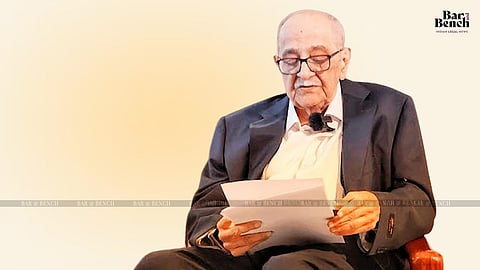
- News
- Columns
- Interviews
- Law Firms
- Apprentice Lawyer
- Legal Jobs
- हिंदी
- ಕನ್ನಡ

Eminent jurist Senior Advocate Fali S Nariman passed on Wednesday morning.
He was 95 years old.
Burial will be held at 10 am at Parsi Aramgah near New Delhi's Khan Market on Thursday, February 22.
This will be followed by Uthamna (prayer meeting) at 4 pm at the Parsi Anjuman (Dharamsala) at Bahadur Shah Zafar Marg.
The legal stalwart is survived by his daughter Anaheeta F Nariman and son and former judge of the Supreme Court, Justice Rohinton F Nariman.
"A towering intellectual," "the conscience keeper for judicial institutions," "one the last legends of the Bar". These were some of the phrases used to describe Nariman.
Through the course of a legal career that lasted more than seven decades, Nariman commanded the respect of one and all at the Bar and the Bench.
After graduating from the Government Law College, Mumbai in 1950, Nariman began his practice at the Bombay High Court. He was designated as a Senior Advocate in 1971. That year, he shifted to Delhi to practice at the Supreme Court of India.
In 1971, Nariman was appointed as Additional Solicitor General by the Indira Gandhi government. He resigned from this post in 1975 when the national emergency was imposed.
A lawyer who was always true to his conscience, Nariman would later resign from representing the Gujarat government in the Project Narmada case after attacks on Christians in the State. In an interview with Bar & Bench back in 2010, he said on maintaining personal values and ethics in the legal profession,
"Law is a matter of the heart, as well as the head. You have to have compassion; it is one of the greatest qualities."
Nariman was instrumental in developing Indian Constitutional Law and appeared in several landmark cases before the Supreme Court.
He appeared in the IC Golaknath case, in which the Supreme Court ruled that Parliament could not curtail Fundamental Rights under the Constitution.
He was part of the team that represented the petitioners in Minerva Mills v. Union of India, in which the Court held that the power of Parliament to amend the Constitution is limited by the Constitution.
In the TMA Pai case, Nariman argued on the scope of minority rights under Article 30 of the Constitution of India.
Nariman argued for Union Carbide in the Bhopal Gas disaster case.
He appeared in Supreme Court Advocates-on-record Association & Anr. v. Union of India, in which the National Judicial Appointments Commission was struck down and the Collegium system was upheld by a five-judge Constitution Bench.
For his contributions to the field of law, Nariman was awarded the Padma Bhushan in 1991 and the Padma Vibhushan in 2007. He was a nominated Member of the Rajya Sabha from 1999-2005.
Throughout his life, Nariman was a vocal critic of the judiciary and regularly called out injustices in the public sphere.
Once a detractor of the Collegium system of judicial appointments, he recently went on record to say that it is the lesser evil. In an interview with Bar & Bench, he said,
"I am not very happy with it, but it's like democracy - the best of all the worst systems."
He recently criticised the verdict of the Supreme Court in which the abrogation of Article 370 was upheld and said that it is regrettable that there was no dissenting judgment.
He openly criticised the conduct of Governors in the present era, terming them colonial institutions.
He was also a staunch supporter of the Basic Structure doctrine, a hotly contested topic this past year. In defence of the Constitution, he recently said,
"Don't blame the Constitution for every damn thing that goes on in this country. Please always realise that it has kept the country together whatever shortcomings there may be need to be dealt with."
Supreme Court handled the Covid migrant labourer crisis "appallingly", he told Bar & Bench in an interview in July 2020.
In 2023, he said that the Collegium system is the lesser evil when it comes to appointing judges. Watch 2023 interview with Nariman here.
Read 2010 interview with Nariman here.